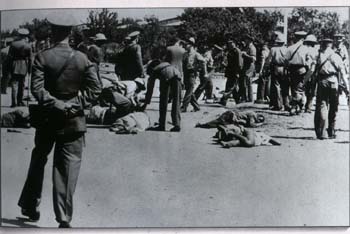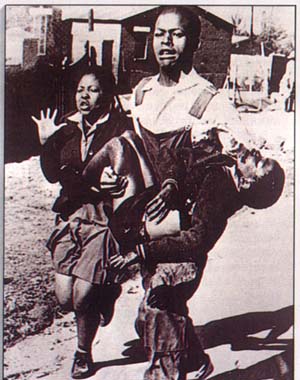|
Time Line:
- mid-17th century -- the Dutch East India Company set up a provisioning
station on the Cape
- By the end of the 18th century--over 10,000 whites were living there,
expelling indigenous peoples like the Khoihoi and San.
- 1795 -- The British seized Cape Town, and the Afrikaaners began the 'Great
Trek' to find new bases.
- 1867 -- diamonds were discovered.
- 1886 -- gold was discovered.
- 1899-1902 Anglo-Boer war
- 1910, the four colonies were joined together under the Act of the Union,
and the British handed the administration of the country over to the White
locals.
- 1913/14 -- The Mines and Works Act and the Land act: a 'color bar' was
legalized and blacks were prohibited from owning land anywhere but in
'native reserves'--7 percent of the whole.
- apartheid officially began in 1948
-- e.g. Population Registration Act: Divided people into three groups
(Black, Colored, or White), prohibiting interracial marriages.
-- e.g. Group Areas Act: Restricted the entrance of Blacks into the urban,
industrial, and agricultural areas, reserving these areas only for the Whites.
-- e.g. The Abolition of Passes and Coordination of Documents Act: required
all Africans to carry a pass-book
-- e.g. The Bantu Authorities Act: assigned all Africans to their native land
- 1960/3/21 -- Sharpville Massacre -- The police opened fire at a group
demonstrating against pass laws and killed 69 people. Cause: against
carrying pass-books;
- the 60's -- banning, censoring and detaining dissidents
 Sharpville Massacre Sharpville Massacre
- 1976 -- student riots originated in Soweto -- 16-month protest saw
575 dead, 2389 injured. Cause: against imposing Afrikaan on secondary
education. (Before 1974, the policy was to use both English and
Afrikaan. In 1974,
however, the government decided to impose the use of Afrikaans in at secondary school level.
The students resisted it since the language was seen as that of the
oppressor's.
| Hector Peterson
"It was a picture that got the world's
attention: A frozen moment in
time that showed 13-year-old
Hector Peterson dying after being
struck down by a policeman's
bullet.
At his side was his 17-year-old sister.
"I saw that he was bad, but I thought
that he was just wounded, you
know," remembers Hector's sister
Antoinette Sithole, " because I
couldn't figure out where." (source) |
 |
Soweto student protest
-
1985-1990 -- state of emergency
-
1990 -- lifting the ban on ANC and PAC, release of Nelson Mandela,
abolition of Apartheid
(another chronology)
|